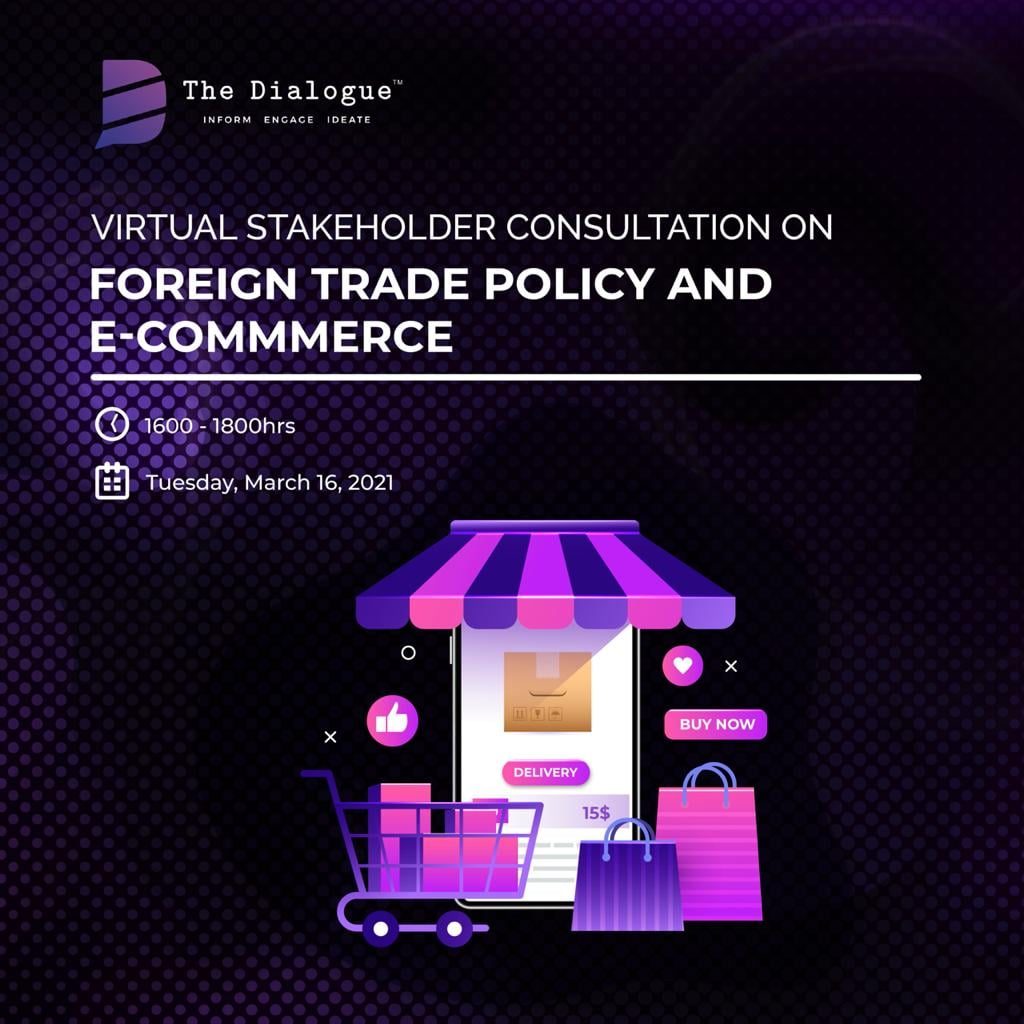The discussion at the event revolved around India’s upcoming foreign trade policy for 2021-26, with a focus on the role of e-commerce exports in boosting MSME’s and the economy at large. The discourse allowed for diverse views to be presented, with the role various stakeholders can play in regulating this sector in a positive manner being highlighted.
The Dialogue held a virtual stakeholder consultation on India’s foreign trade policy in the context of e-commerce exports on March 16, 2021. This consultation was conducted in response to India’s upcoming foreign trade policy for 2021-2026, which is under formulation and will come into effect from April 1, 2021. The policy is aimed at maximising India’s resources to help become a leader in the area of international trade. The discussion was moderated by Mr. Kazim Rizvi, Founding Director, The Dialogue and was attended by a variety of stakeholders from across the industry along with representatives of the media, legal and policy organisations. The consultation was held under Chatham House rules.
The panel consisted of Mr. Dhanendra Kumar, a senior bureaucrat and former Executive Director of World Bank, Ambassador (Prof) Dr. Mohan Kumar, a leading international affairs academic and one of India’s lead negotiators at the World Trade Organisation, Dr Aruna Sharma, a development economist who has been a part of a high level RBI committee monitoring digital payments, as well as senior diplomat and foreign affairs stalwart Ambassador Pinak Ranjan Chakravarty (IFS) (Retd.). The primary objective of the consultation was to understand the views of various stakeholders when it comes to the regulation of this sector, and dive into the discourse surrounding the way forward towards creating an optimal policy framework in this context.
The discussion kickstarted with a mapping of the industry, relevant stakeholders and its overall long-term potential, before providing some context around India’s foreign trade policy over the past decade. The panelists set the foundation on how structural changes around e-commerce export policy can power us towards a 5 trillion USD economy and said, that for India to become a 5 trillion USD economy, foreign trade needs to double with increased exports. India as a part of its foreign trade policy, should support and take an active role in WTO reforms. Climate change is an important aspect of Foreign Trade Policy and active emphasis should be laid on the same to ensure a sustainable growth.
The panel then shifted focus towards the challenges faced by MSMEs driving forward e-commerce exports. This included discourse around overarching challenges and granular issues faced by MSMEs trying to push towards e-commerce exports, before discussing the industry view on potential ways in which a regulatory framework could support this sector. On that note, panellists added that public policy needs to be in sync, consistent and convergent with each other for structural growth, thus we must create harmony among our Foreign Trade, E-commerce and Data Privacy policies. The future is e-commerce and thus we have to enter into a modernised, well-packaged, more automated and standardised production line which will be accepted both domestically and internationally.
Having got a broad view on India’s foreign trade policy and the challenges faced by MSMEs in driving forward e-commerce exports, the discussion pivoted towards specific regulatory solutions around e-commerce exports and international best practices in this respect. On this front, the discussants highlighted that technology should be the main focus of any policy while training should be imbibed as a major aspect of trade policy. The establishment of an efficient governance system along with stakeholders’ consultation is crucial for pushing these developmental initiatives.
The dialogue then progressed towards the government’s potential plans on the way forward in terms of MSME exports in the upcoming foreign trade policy. The panel also elucidated their views on the potential implementation challenges that the government could face in their effort to create an enabling regulatory framework. MSMEs are the biggest drivers of economic growth, a unit of investment creates maximum employment. We need to link MSMEs effectively, provide proactive regulatory architecture and special ease of doing business. India should establish separate knowledge hubs, export promotion councils for MSMEs and galvanize District Export Hubs to achieve our economic target. In this new normal, the role of e-commerce is enormous and India can play an important role as an export powerhouse in the process.
In their concluding remarks, the panel mapped the potential way forward for India, with the experts providing a variety of suggestions to contribute towards the discourse. They finally underlined how it is imperative for the government to work towards developing enabling regulatory mechanisms which will help overcome the challenges in the sector and allow all involved stakeholders to flourish.
